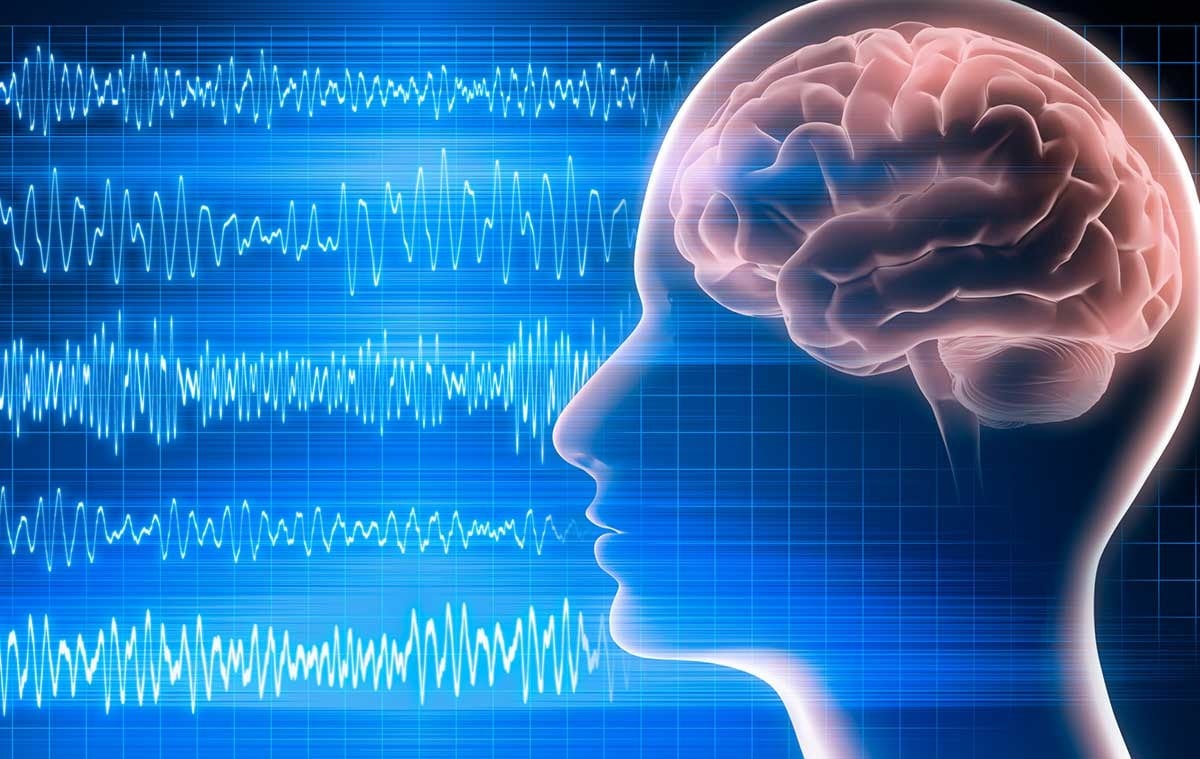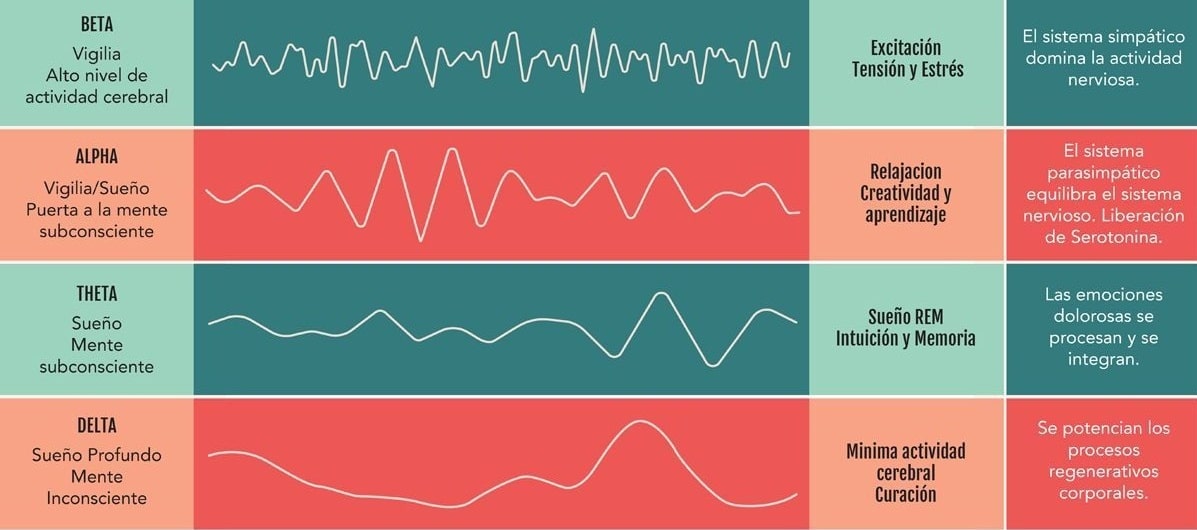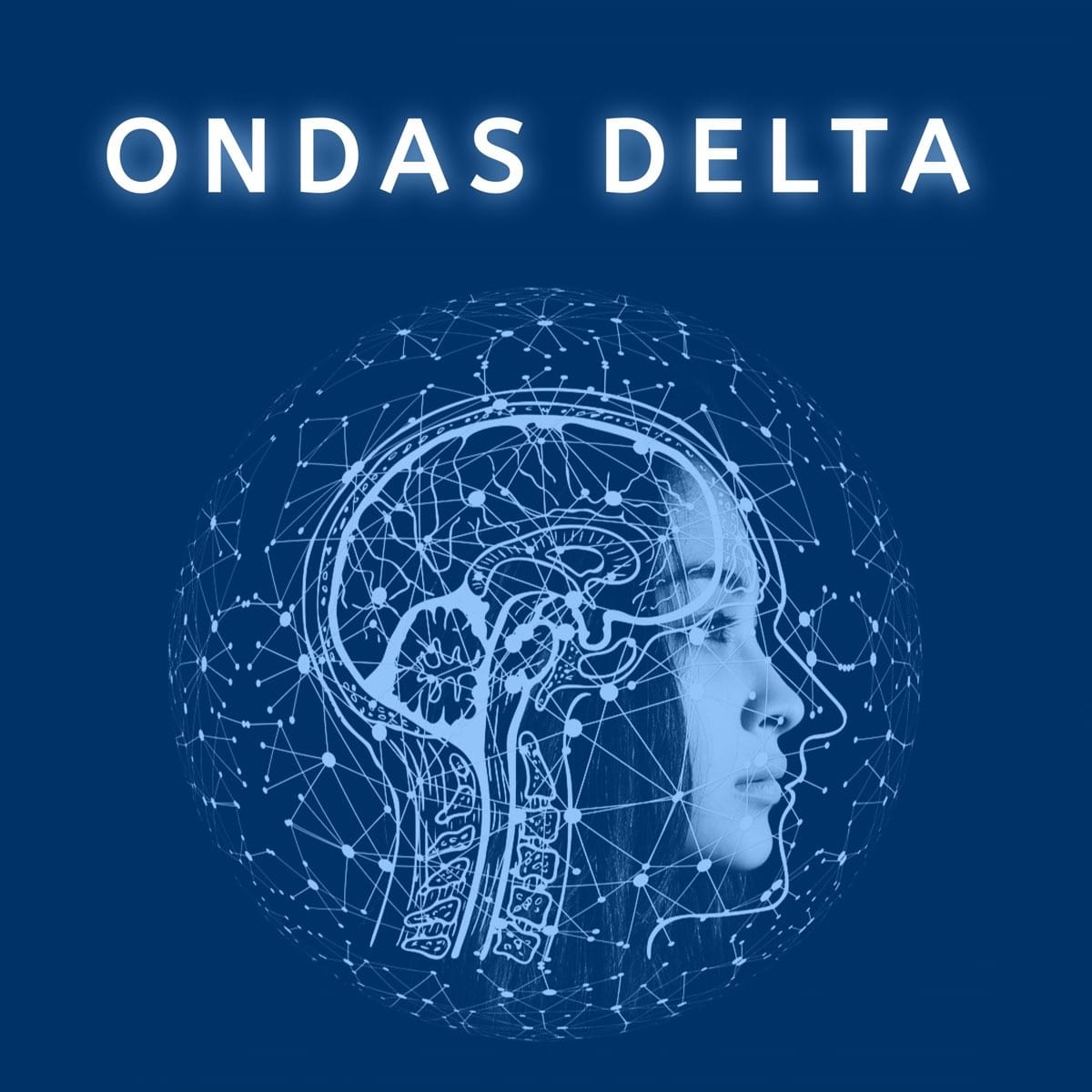
Delta waves arouse both interest and mystery. These are the slowest waves (0-4Hz) emitted by the brain and are produced during deep sleep and in states of maximum relaxation.like meditation. They are, above all, waves that occur in non-conscious states of mind and have been linked to emotional states of well-being and inner peace.
It has also been seen that they are associated with cognitive processes such as decision-making, as well as disorders associated with their imbalance, such as migraines or ADHD. However, its effects are still under study. If you want to know more about this type of brain waves, we invite you to discover What does science tell us about delta waves?
What are brain waves?

It is convenient to clarify what brain waves are before introducing ourselves to the study of one of them in particular: delta waves, the subject that concerns us in this post.
Brain waves are the physical manifestation -in the form of electromagnetic waves- of the electrical activity of the brain.
The brain is made up of billions of neurons that are synaptically connected to each other, generating an electrical impulse from one to the other as a result of that interaction. When a set of neurons communicate synchronously with each other, an electrical impulse is produced that is tangible and can be measured by electroencephalogram.
As we already know, the brain is an extremely complex as well as extraordinary organ, so the nature of these waves is diverse and the emission of each of them depends on the type of process that is being carried out at that moment. We can associate the different types of waves with different states of activation, mood or concentration. Thus, up to five types of waves have been detected, which we will mention in increasing order of frequency and are: ondas delta (1-4Hz), theta (4-8Hz), alpha(8-12Hz), beta (12-35Hz) y gamma(above 30Hz).
This communication between neurons in the brain is what gives rise to thoughts and therefore emotions and behavior. That is, they are responsible for configuring who we are.
In the case at hand, it can be said that delta waves are the slowest emitted by the brain and have been recorded in the deep sleep phase as well as in other processes that will surprise you. Therefore, this time we invite you to discover What does science tell us about delta waves?
"Neuroscience is by far the most exciting branch of science, because the brain is the most fascinating object in the universe. Every human brain is different, the brain makes every human being unique and defines who they are."
Stanley B. Prusiner (Nobel Prize in Medicine, 1997)
What are delta waves?

Delta waves are just one type of five brain waves that exist (delta, theta, alpha, beta, and gamma). of all of them it is the slowest or lowest frequency and occurs during deep sleep, in the non-REM phase (when we do not dream), that is, while we are unconscious. That is why they are associated with good rest and therefore with emotional states of well-being and tranquility.
Its oscillation range is between 0 and 4Hz and went discovered by Gray Walter at the beginning of the XNUMXth century. What science tells us about delta waves is as interesting as it is insufficient, since -although there have been significant discoveries- it is not yet known how they operate, so delta waves contain a certain aura of mystery as well as fascination .
They have also been linked to cognitive processes, as well as intuition and certain pathologies when they are altered. In the following lines we will tell you everything you need to know about delta waves, their effects and the most recent discoveries.
Delta wave functions

Delta waves contribute significantly to an improvement in overall health. We see how:
- are directly responsible for good rest. It has been seen that subjects who cannot fall asleep deeply, that is, who do not generate delta waves, experience tiredness and symptoms of fatigue throughout the day. In this sense, it has been seen that a low emission of delta frequencies is related to headaches and migraines. This is reported by a study of The American Headache Society.
- They affect motivation and empathy. It has been suggested that when the brain frequently produces delta waves, people become more enthusiastic and empathetic, improving their social relationships.
- They contribute to the general functioning of all basic functions of the organism. It has been proven that the absence of delta wave generation alters other physiological rhythms, such as heartbeat or respiration, to varying degrees. This usually occurs in stressful situations where it is common to experience shallow and short breaths as well as cardiac arrhythmias.
- they are probably linked to the phenomenon of cardiac coherence: the heart is endowed with an important population of neurons so that it also emits its own electromagnetic frequency, which is also closely linked to that of the brain. Thus was born the wonderful phenomenon of cardiac coherence, which arises when both electromagnetic fields (heart-brain) are in sync. The result is a state of well-being and balance. Since delta waves are generated in states of tranquility and well-being, it is very likely that they have their leading part in this event.
- For everything mentioned so far, it is estimated that they could have a important participation in intuitive processes. Intuition is a mode of perception linked to unconscious areas of the brain that are today identified, despite the fact that little credit has been given to both its existence and its validity, studies increasingly demystify its bad press and apparently the waves delta play a relevant role by being generated in unconscious states of mind.
- Anti-stress effect: a study of Wanee Rojviroj concludes that delta waves are in themselves anti-stress and it is believed that they could be related to the synthesis of serotonin and melatonin, thus generating states of calm and well-being. The processes that link delta waves with the synthesis of these hormones have not yet been determined, so for now it is only a hypothesis.
- Are involved in cognitive processes such as decision making, memory, perception and learning and this is determined by a work published in the Proceedings of the National Academy of Sciences (PNAS) where it has been seen that:"When there is no decision making, the oscillatory activity of brain delta waves decreases significantly." Likewise, the role that delta waves play in the synchronization of separate brain areas that work functionally as a unit in decision-making has been determined. For this reason, it has been seen that an altered pattern in brain delta wave oscillations is related to with learning and behavioral disorders such as ADHD.
- Delta waves are believed to they modulate the brain activity of the newborn to adapt to the multitude of stimuli encountered in the outside world. It has been seen that these waves are predominant in the fetus and continue until the first year of life, although they are generated with less frequency after birth.
Pathways to generate delta waves

- The first one is good rest, for all the reasons already mentioned.
- Another alternative is the meditation: promoting a state of full consciousness and harmonic breathing would facilitate the generation of delta waves by the brain. There is already a record that, in effect, delta waves are produced in meditative states where the perception of stillness and inner peace is more than notified.
- Listen to relaxing music with delta frequencies: the brain synchronizes with its environment and listening to this type of waves promotes their generation, facilitating relaxation and inducing sleep.
- And finally the Neurofeedback: is a technique that trains the brain to learn to increase certain brain waves, so that optimal brain regulation is achieved and consequently improves the functioning and well-being of the person. It is a clinical practice that can be used to treat stress, anxiety, insomnia, depression or ADHD.
We are generating less and less delta waves

This has not only been seen in the first year of children but also in adults. The hectic pace of our days makes us immersed in a constant state of stress and agitation that significantly decreases the generation of brain delta waves.
Insomnia, anxiety, depression, etc. These are the great ills of the XNUMXst century and it is urgent to become aware of how stress makes us sick, altering an endless number of physiological parameters as well as the pattern of delta oscillations in the brain.
We are sure that after reading this article you will want to "introduce more delta waves into your life", not only to improve your health but also to improve the quality of your day-to-day life. We are pleased to know that knowing what science tells us about delta waves has been able to help improve your quality of life.